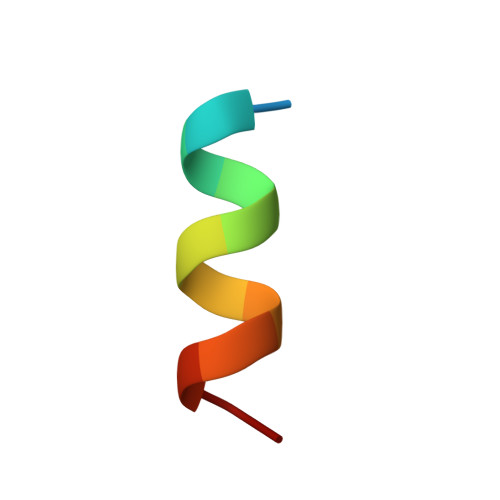Centrosymmetric bilayers in the 0.75 A resolution structure of a designed alpha-helical peptide, D,L-Alpha-1.
Patterson, W.R., Anderson, D.H., DeGrado, W.F., Cascio, D., Eisenberg, D.(1999) Protein Sci 8: 1410-1422
- PubMed: 10422829
- DOI: https://doi.org/10.1110/ps.8.7.1410
- Primary Citation of Related Structures:
3AL1 - PubMed Abstract:
We report the 0.75 A crystal structure of a racemic mixture of the 12-residue designed peptide "Alpha-1" (Acetyl-ELLKKLLEELKG), the L-enantiomer of which is described in the accompanying paper. Equivalent solutions of the centrosymmetric bilayers were determined by two direct phasing programs in space groups P1 and P1bar. The unit cell contains two L-alpha-helices and two D-alpha-helices. The columnar-sheet bilayer motif seen in L-Alpha-1 is maintained in the D,L-Alpha-1 structure except that each sheet of head-to-tail helices is composed of one enantiomer and is related to its neighboring sheets by inversion symmetry. Comparison to the L-Alpha-1 structure provides further insight into peptide design. The high resolution and small asymmetric unit allowed building an intricate model (R = 13.1%, Rfree = 14.5%) that incorporates much of the discrete disorder of peptide and solvent. Ethanolamine and 2-methyl-2,4-pentanediol (MPD) molecules bind near helix termini. Rigid body analysis identifies sites of restricted displacements and torsions. Side-chain discrete disorder propagates into the backbone of one helix but not the other. Although no side chain in Alpha-1 is rigid, the environments in the crystal restrict some of them to no or only one active torsion.
Organizational Affiliation:
Molecular Biology Institute at UCLA and the Department of Chemistry and Biochemistry, University of California, Los Angeles 90095-1570, USA.
















